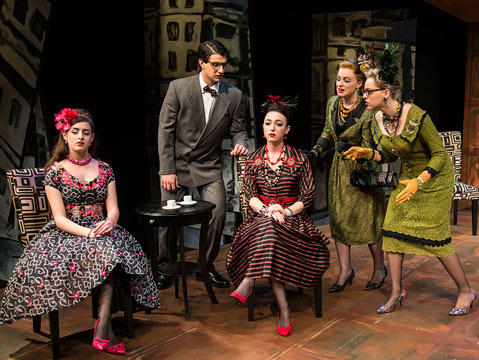Absolutely! (perhaps) Reviewed
Pirandello Plays with Perceptions

Luigi Pirandello harmoniously weaves paradox with truth and fantasy with reality in his play Così è (se vi pare), or Absolutely! (perhaps), as this English version has it. Director Simon Williams and his UCSB cast did not shy away from the challenges of such daring material and potentially absurd characters.
Set in a small Italian town in the 1950s, the whole play takes place in the drawing room and study of Councillor Agazzi (Joe Samaniego) with the townspeople eagerly flitting in and out in an attempt to ascertain the truth from two of the town’s newest inhabitants, a mother (Dani Hernandez) and her son-in-law (Ian Watson), about the identity of a third newcomer. Is she the daughter of the mother, Signora Frola? Or is she the second wife of son-in-law Signor Ponza? Polite albeit pressing questions lead to an interrogation by the Mayor (Erin Pettigrew), and gradually the curious townspeople all become familiar with such phenomena as slippery truths, varying perceptions of reality, and rampant gossip, yet at the end of the play, they appear to be just as far from understanding these concepts as they were at the beginning. They will stop at nothing to ascertain the truth, overstepping boundaries that even include the theater’s implicit fourth wall.
Patrick Arter does a fabulous job of conveying the enjoyment that Lamberto Laudisi, brother-in-law to the Councillor, takes in manipulating the situation and confusing the townspeople through his philosophizing. In contrast to the suave Laudisi is the hilariously uncomfortable Signora Cini (Chase O’Donnell). O’Donnell smoothly portrays that one socially awkward acquaintance we all have, and whose name we, like the townspeople, occasionally forget.
But it is Signora Frola and Signor Ponza who form the play’s most profoundly contrasting character pair, and it’s only when Signora Ponza herself finally comes onstage that someone can explain how the three of them have lived happily up until their reality began to be questioned. After that last bit of insight, Laudisi sarcastically declares: “The truth has spoken.”



